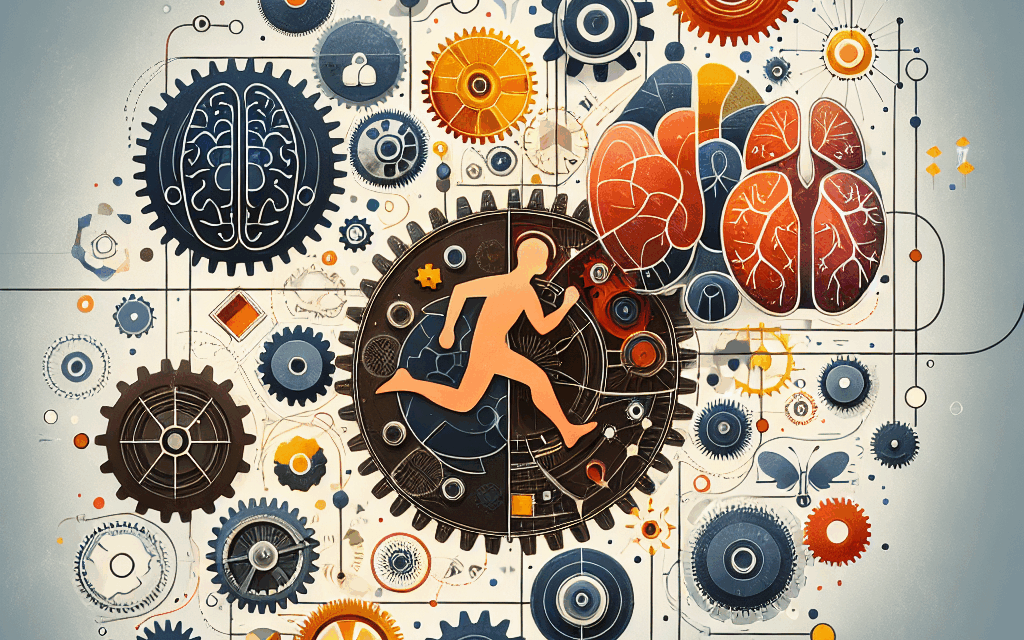The Interconnection of Mind and Body: Understanding the Link Between Behavioral and Physical Health
The relationship between mind and body has been a subject of fascination and study for centuries. From ancient philosophies to modern scientific research, the understanding of how our mental state influences physical health—and vice versa—has evolved significantly. This article delves into the intricate connections between behavioral and physical health, exploring various dimensions of this relationship through five key subtopics: the psychological impact on physical health, the role of stress and its physiological effects, the influence of lifestyle choices, the importance of mental health in chronic illness management, and the emerging field of psychoneuroimmunology.
The Psychological Impact on Physical Health
Psychological factors play a crucial role in determining physical health outcomes. Mental health conditions such as depression, anxiety, and stress can manifest in physical symptoms and contribute to various health issues. Research has shown that individuals with mental health disorders are at a higher risk for developing chronic physical conditions, including heart disease, diabetes, and obesity.
One significant study published in the journal “Psychosomatic Medicine” found that individuals with depression had a 64% higher risk of developing coronary heart disease compared to those without depression. This correlation can be attributed to several mechanisms:
- Behavioral Factors: Individuals with depression may engage in unhealthy behaviors such as poor diet, lack of exercise, and substance abuse, which can lead to physical health problems.
- Physiological Changes: Depression can cause changes in the body’s stress response, leading to increased inflammation and altered hormone levels, which can negatively impact cardiovascular health.
- Social Isolation: Mental health issues often lead to social withdrawal, reducing support systems and increasing the risk of physical health decline.
Moreover, anxiety disorders can also have profound effects on physical health. For instance, chronic anxiety can lead to gastrointestinal issues, chronic pain, and even cardiovascular problems. A study published in “The American Journal of Psychiatry” found that individuals with generalized anxiety disorder had a significantly higher risk of developing gastrointestinal disorders, highlighting the mind-body connection.
Addressing mental health is essential for improving physical health outcomes. Integrative approaches that combine psychological therapies with physical health interventions can lead to better overall health. Cognitive-behavioral therapy (CBT), for example, has been shown to reduce symptoms of anxiety and depression, which in turn can lead to improved physical health.
The Role of Stress and Its Physiological Effects
Stress is a common experience that can have profound effects on both mental and physical health. The body’s response to stress involves a complex interplay of hormones and physiological changes, often referred to as the “fight or flight” response. While this response can be beneficial in short bursts, chronic stress can lead to significant health issues.
When an individual experiences stress, the body releases hormones such as cortisol and adrenaline. While these hormones prepare the body to respond to immediate threats, prolonged exposure can lead to detrimental effects:
- Increased Inflammation: Chronic stress is associated with elevated levels of inflammation in the body, which is linked to various health conditions, including heart disease, diabetes, and autoimmune disorders.
- Weakened Immune System: Prolonged stress can suppress the immune system, making individuals more susceptible to infections and illnesses.
- Cardiovascular Issues: Stress can lead to increased heart rate and blood pressure, contributing to the development of hypertension and other cardiovascular diseases.
Research has shown that stress management techniques can significantly improve physical health. For example, a study published in “Health Psychology” found that individuals who practiced mindfulness meditation experienced lower levels of cortisol and improved immune function. Techniques such as yoga, meditation, and deep-breathing exercises can help mitigate the effects of stress on the body.
Furthermore, understanding the sources of stress and developing coping strategies is essential for maintaining both mental and physical health. Cognitive-behavioral approaches can help individuals identify stressors and develop healthier responses, ultimately leading to improved health outcomes.
The Influence of Lifestyle Choices
Lifestyle choices play a pivotal role in the interconnection between mind and body. Factors such as diet, exercise, sleep, and substance use can significantly impact both mental and physical health. Making informed lifestyle choices can lead to improved well-being and a reduced risk of chronic diseases.
Nutrition is one of the most critical aspects of lifestyle that affects both mental and physical health. A balanced diet rich in fruits, vegetables, whole grains, and lean proteins has been associated with lower rates of depression and anxiety. A study published in “The American Journal of Psychiatry” found that individuals who adhered to a Mediterranean diet had a significantly lower risk of developing depression.
Exercise is another vital component of a healthy lifestyle. Regular physical activity has been shown to have numerous benefits for both mental and physical health:
- Improved Mood: Exercise releases endorphins, which can enhance mood and reduce symptoms of anxiety and depression.
- Enhanced Cognitive Function: Physical activity has been linked to improved cognitive function and a lower risk of cognitive decline.
- Better Sleep: Regular exercise can improve sleep quality, which is essential for overall health and well-being.
Sleep is often overlooked but is crucial for maintaining both mental and physical health. Chronic sleep deprivation can lead to a host of health issues, including obesity, diabetes, and cardiovascular disease. Additionally, lack of sleep can exacerbate mental health conditions, creating a vicious cycle. A study published in “Sleep” found that individuals with insomnia were at a higher risk of developing anxiety and depression, emphasizing the importance of prioritizing sleep for overall health.
Substance use, including alcohol and tobacco, also plays a significant role in the mind-body connection. Excessive alcohol consumption can lead to mental health issues such as depression and anxiety, while smoking is associated with increased stress levels and a higher risk of chronic diseases. Making healthier choices regarding substance use can have profound effects on both mental and physical health.
The Importance of Mental Health in Chronic Illness Management
Chronic illnesses such as diabetes, heart disease, and cancer can have a significant impact on mental health. The stress of managing a chronic condition can lead to feelings of anxiety, depression, and hopelessness. Conversely, poor mental health can negatively affect the management of chronic illnesses, creating a cycle that can be challenging to break.
Research has shown that individuals with chronic illnesses are at a higher risk of developing mental health disorders. For example, a study published in “The Journal of Clinical Psychiatry” found that nearly 30% of individuals with diabetes experience symptoms of depression. This relationship can be attributed to several factors:
- Biological Factors: Chronic illnesses can lead to changes in brain chemistry and hormone levels, contributing to mental health issues.
- Psychosocial Factors: The burden of managing a chronic illness can lead to social isolation, financial stress, and a reduced quality of life, all of which can impact mental health.
- Behavioral Factors: Individuals with poor mental health may struggle to adhere to treatment regimens, leading to worse health outcomes.
Integrating mental health care into the management of chronic illnesses is essential for improving overall health outcomes. A study published in “The Annals of Family Medicine” found that patients with diabetes who received mental health support had better glycemic control and improved quality of life. Collaborative care models that involve both medical and mental health professionals can provide comprehensive support for individuals managing chronic conditions.
Additionally, self-management strategies that incorporate mental health support can empower individuals to take control of their health. Programs that teach coping skills, stress management techniques, and problem-solving strategies can help individuals navigate the challenges of living with a chronic illness.
The Emerging Field of Psychoneuroimmunology
Psychoneuroimmunology (PNI) is an interdisciplinary field that explores the interactions between psychological processes, the nervous system, and the immune system. This emerging area of research highlights the profound impact that mental health can have on physical health through immune system functioning.
Studies in PNI have shown that psychological stress can lead to immune dysregulation, increasing susceptibility to infections and diseases. For example, a study published in “Psychosomatic Medicine” found that individuals experiencing high levels of stress had a significantly weaker immune response to the influenza vaccine compared to those with lower stress levels.
The mechanisms underlying these interactions are complex and involve various biological pathways:
- Cortisol and Immune Function: Chronic stress leads to elevated cortisol levels, which can suppress immune function and increase inflammation.
- Neurotransmitters: Stress can alter the levels of neurotransmitters such as serotonin and dopamine, which play a role in immune regulation.
- Behavioral Changes: Stress can lead to unhealthy behaviors such as poor diet and lack of exercise, further impacting immune health.
Understanding the link between mental health and immune function has significant implications for health care. Interventions that target stress reduction and mental well-being may enhance immune function and improve overall health outcomes. For instance, mindfulness-based stress reduction programs have been shown to improve immune responses in individuals with chronic illnesses.
As research in PNI continues to evolve, it offers promising insights into how addressing mental health can lead to better physical health outcomes. Integrating mental health care into traditional medical practices may enhance the effectiveness of treatments and improve patient well-being.
Conclusion
The interconnection between mind and body is a complex and multifaceted relationship that has significant implications for health and well-being. Understanding how psychological factors influence physical health—and vice versa—can lead to more effective interventions and improved health outcomes.
Key takeaways from this exploration include:
- The psychological impact on physical health is profound, with mental health conditions increasing the risk of chronic diseases.
- Chronic stress has detrimental physiological effects that can lead to various health issues, emphasizing the importance of stress management.
- Lifestyle choices, including diet, exercise, sleep, and substance use, play a critical role in the mind-body connection.
- Mental health is essential in managing chronic illnesses, and integrating mental health care into treatment plans can improve outcomes.
- The emerging field of psychoneuroimmunology highlights the importance of addressing mental health to enhance immune function and overall health.
As we continue to unravel the complexities of the mind-body connection, it becomes increasingly clear that a holistic approach to health—one that considers both mental and physical well-being—is essential for achieving optimal health outcomes. By prioritizing mental health and recognizing its impact on physical health, we can foster a more integrated approach to health care that benefits individuals and communities alike.





